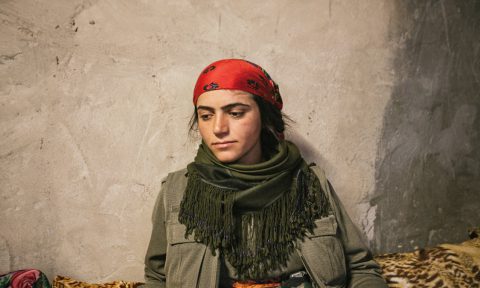Al-Monitor stated in an analytical report that the biggest threat now threatening the Syrian Kurds is poverty, as it pushes Syrians into the arms of ISIS.
The following article is a summary of the above statement. The Observer does not reject or approve the content of this report.
“ISIL’s monetary offers to join its ranks are” irresistible “for those severely affected by Syria’s shattered economy, the report said. The report refers to Syrian Kurdish prisoners who have a history of being members of ISIS.
Save The Children: 62 children died in al-Hol camp this year
These prisoners, for example, are being held in a military prison in the Kurdish city of Hasakah in northeastern Syria, and their main crime is membership in ISIS. Many detainees told Al-Monitor that they had joined the group because of ISIL funding. A prisoner with 24 years and 3 children confirmed: “I did this for money. “Because of the drought, my farm was destroyed and I had a lot of debt.”
Kurdish officials in charge of running the high-security prison said, “ISIL pays people and pays thousands of dollars to attract young people to their place.” “About 50 ISIL terrorists held in this prison were captured this year, and all of them joined ISIL for money.”
Syria has suffered from the worst drought in 70 years; Because agriculture is one of the main sources of income in northeastern Syria, where most of the country’s crops are grown. Drought following the Covid-19 epidemic, the collapse of the Syrian national currency, and international sanctions against the government of Syrian President Bashar al-Assad have made millions poorer, and some, like prisoners in the prison, have joined ISIL to achieve their dreams.
Many also risk their lives trying to flee the country illegally to Europe. “Many ISIL members live in Turkish-occupied areas and have helped ISIL because they need money,” Al-Monitor quoted prisoners as saying.
It should be noted that after the defeat of ISIS in Iraq and Syria, the group and its global allies are seeking to reorganize and launch increasingly daring attacks in areas such as Afghanistan and Uganda alongside their traditional strongholds in Syria and Iraq.
Kurdish officials are deeply concerned about young people joining ISIL due to poverty and even attacks by free ISIL members on prisoners.
Water as a Weapon: Turkey, Syria, Iraq, and the Water Wars yet to come
According to the Syrian Kurdish Regional Intelligence Center, an independent research organization in northeastern Syria, ISIL cell attacks are on the rise, especially in the predominantly Arab Deir al-Zour region. Of the 22 attacks recorded in November, 14 were carried out by ISIS members.
The US Treasury Department noted in a recent report that ISIL “probably has tens of millions of dollars in cash reserves scattered throughout the region” and that it “often relies on its facilitators in Turkey and other financial centers to transfer funds in.” “And it continues outside Syria and Iraq.”
Mazlum Kobani, commander-in-chief of the Syrian Democratic Forces (Kurdish militias), recently told Al-Monitor that one of the biggest threats to northeastern Syria is no longer physical attacks by ISIL, but the group’s militias’ ability to exploit the current economic crisis to recruit is new.
“These unfavorable economic conditions are affecting our fight against [ISIS],” Kobani said. Its ability to retake areas is increasingly linked to the economic situation in Syria. “The number of unemployed is very high and people are suffering from widespread poverty.”
According to the United Nations, approximately 60 percent of Syria’s population of 21 million has “food insecurity” and nearly 12 million people have lost access to food, water and electricity as a result of the drought. “Everywhere you look today, the tide of protectionist sentiment is flowing. “People have stopped eating fruits and vegetables, cheese and eggs.”
The relative stability and prosperity observed in the Northeast compared to the rest of Syria, thanks in part to US military support and funding, due to Ankara’s ongoing drought and hostility, including limited access to water for more than one million people. Residents of Hasakah are increasingly at risk.
How Viable Is The Kurds’ Autonomous Territory In Northeast Syria?
Kobani argues that the first trade order should be for the United States to exempt the Northeast from crippling sanctions imposed on the Syrian government in order to open the way for potential investors, especially in the oil sector. But the Biden administration has not yet surrendered and has refused to extend the exemption granted to an American oil company under the Trump administration that had signed a contract with the Kurdish-led government.
The idea of the return of ISIS is unbearable for Abed Mohabs, the co-chair of the Northeastern Syrian Executive Council (Raqqa-based top administrative body); “When we first came here to rebuild the city, there were animals eating the bodies of dead ISIL members,” he said. Raqqa was destroyed. Since then, 60% of the city’s vital infrastructure has been rebuilt. “More than 10,000 Kurds sacrificed their lives for this.”
The interviewed prisoners insisted that the biggest threat to the Kurdish-led autonomous region is Turkey’s ruling Party AKP.










